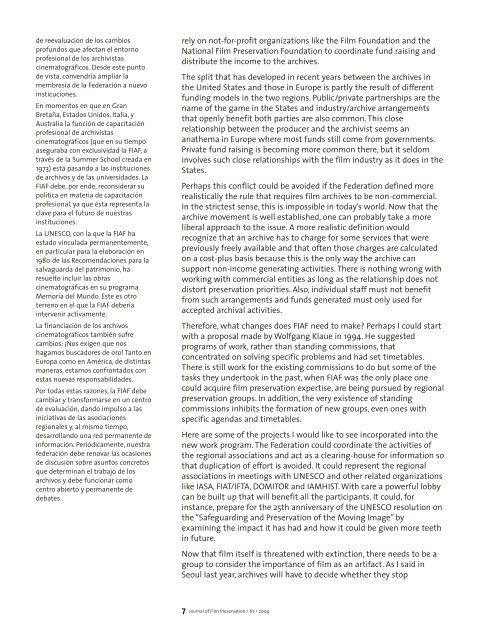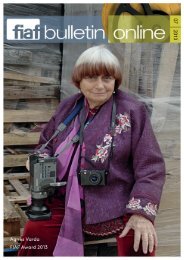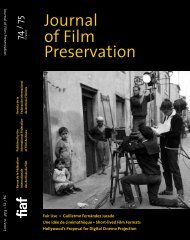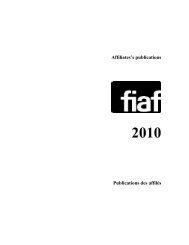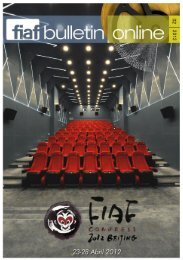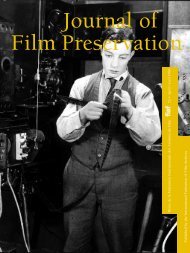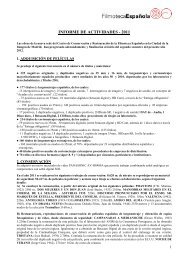Journal of Film Preservation - FIAF
Journal of Film Preservation - FIAF
Journal of Film Preservation - FIAF
Create successful ePaper yourself
Turn your PDF publications into a flip-book with our unique Google optimized e-Paper software.
de reevaluación de los cambios<br />
pr<strong>of</strong>undos que afectan el entorno<br />
pr<strong>of</strong>esional de los archivistas<br />
cinematográficos. Desde este punto<br />
de vista, convendría ampliar la<br />
membresía de la Federación a nuevo<br />
insticuciones.<br />
En momentos en que en Gran<br />
Bretaña, Estados Unidos, Italia, y<br />
Australia la función de capacitación<br />
pr<strong>of</strong>esional de archivistas<br />
cinematográficos (que en su tiempo<br />
aseguraba con exclusividad la <strong>FIAF</strong>, a<br />
través de la Summer School creada en<br />
1973) está pasando a las instituciones<br />
de archivos y de las universidades. La<br />
<strong>FIAF</strong> debe, por ende, reconsiderar su<br />
política en materia de capacitación<br />
pr<strong>of</strong>esional, ya que ésta representa la<br />
clave para el futuro de nuestras<br />
instituciones.<br />
La UNESCO, con la que la <strong>FIAF</strong> ha<br />
estado vinculada permanentemente,<br />
en particular para la elaboración en<br />
1980 de las Recomendaciones para la<br />
salvaguarda del patrimonio, ha<br />
resuelto incluir las obras<br />
cinematográficas en su programa<br />
Memoria del Mundo. Este es otro<br />
terreno en el que la <strong>FIAF</strong> debería<br />
intervenir activamente.<br />
La financiación de los archivos<br />
cinematográficos también sufre<br />
cambios: ¡Nos exigen que nos<br />
hagamos buscadores de oro! Tanto en<br />
Europa como en América, de distintas<br />
maneras, estamos confrontados con<br />
estas nuevas responsabilidades.<br />
Por todas estas razones, la <strong>FIAF</strong> debe<br />
cambiar y transformarse en un centro<br />
de evaluación, dando impulso a las<br />
iniciativas de las asociaciones<br />
regionales y, al mismo tiempo,<br />
desarrollando una red permanente de<br />
información. Periódicamente, nuestra<br />
federación debe renovar las ocasiones<br />
de discusión sobre asuntos concretos<br />
que determinan el trabajo de los<br />
archivos y debe funcionar como<br />
centro abierto y permanente de<br />
debates.<br />
rely on not-for-pr<strong>of</strong>it organizations like the <strong>Film</strong> Foundation and the<br />
National <strong>Film</strong> <strong>Preservation</strong> Foundation to coordinate fund raising and<br />
distribute the income to the archives.<br />
The split that has developed in recent years between the archives in<br />
the United States and those in Europe is partly the result <strong>of</strong> different<br />
funding models in the two regions. Public/private partnerships are the<br />
name <strong>of</strong> the game in the States and industry/archive arrangements<br />
that openly benefit both parties are also common. This close<br />
relationship between the producer and the archivist seems an<br />
anathema in Europe where most funds still come from governments.<br />
Private fund raising is becoming more common there, but it seldom<br />
involves such close relationships with the film industry as it does in the<br />
States.<br />
Perhaps this conflict could be avoided if the Federation defined more<br />
realistically the rule that requires film archives to be non-commercial.<br />
In the strictest sense, this is impossible in today’s world. Now that the<br />
archive movement is well established, one can probably take a more<br />
liberal approach to the issue. A more realistic definition would<br />
recognize that an archive has to charge for some services that were<br />
previously freely available and that <strong>of</strong>ten those charges are calculated<br />
on a cost-plus basis because this is the only way the archive can<br />
support non-income generating activities. There is nothing wrong with<br />
working with commercial entities as long as the relationship does not<br />
distort preservation priorities. Also, individual staff must not benefit<br />
from such arrangements and funds generated must only used for<br />
accepted archival activities.<br />
Therefore, what changes does <strong>FIAF</strong> need to make? Perhaps I could start<br />
with a proposal made by Wolfgang Klaue in 1994. He suggested<br />
programs <strong>of</strong> work, rather than standing commissions, that<br />
concentrated on solving specific problems and had set timetables.<br />
There is still work for the existing commissions to do but some <strong>of</strong> the<br />
tasks they undertook in the past, when <strong>FIAF</strong> was the only place one<br />
could acquire film preservation expertise, are being pursued by regional<br />
preservation groups. In addition, the very existence <strong>of</strong> standing<br />
commissions inhibits the formation <strong>of</strong> new groups, even ones with<br />
specific agendas and timetables.<br />
Here are some <strong>of</strong> the projects I would like to see incorporated into the<br />
new work program. The Federation could coordinate the activities <strong>of</strong><br />
the regional associations and act as a clearing-house for information so<br />
that duplication <strong>of</strong> effort is avoided. It could represent the regional<br />
associations in meetings with UNESCO and other related organizations<br />
like IASA, FIAT/IFTA, DOMITOR and IAMHIST. With care a powerful lobby<br />
can be built up that will benefit all the participants. It could, for<br />
instance, prepare for the 25th anniversary <strong>of</strong> the UNESCO resolution on<br />
the “Safeguarding and <strong>Preservation</strong> <strong>of</strong> the Moving Image” by<br />
examining the impact it has had and how it could be given more teeth<br />
in future.<br />
Now that film itself is threatened with extinction, there needs to be a<br />
group to consider the importance <strong>of</strong> film as an artifact. As I said in<br />
Seoul last year, archives will have to decide whether they stop<br />
7 <strong>Journal</strong> <strong>of</strong> <strong>Film</strong> <strong>Preservation</strong> / 67 / 2004


